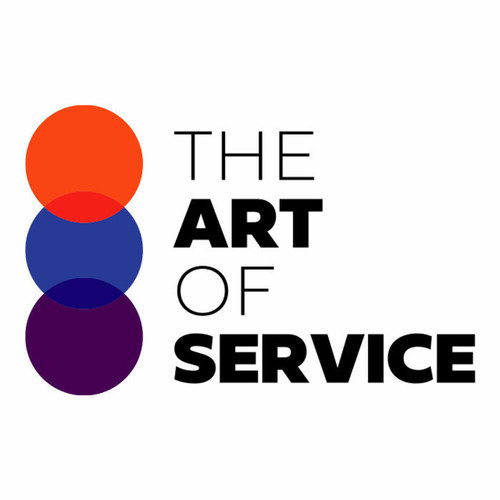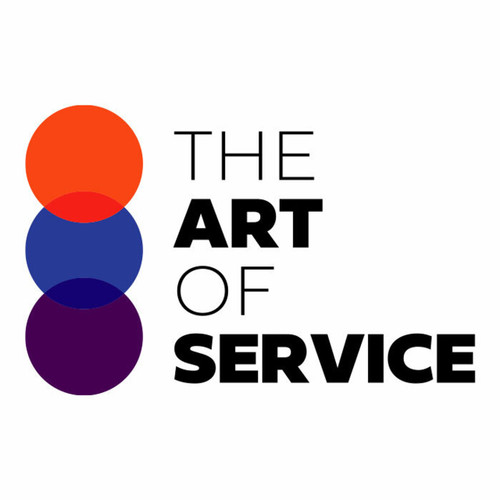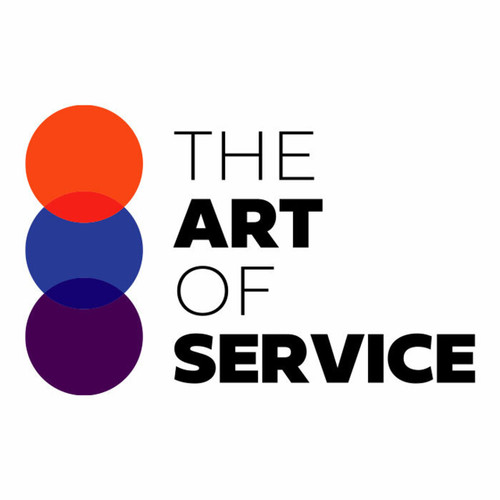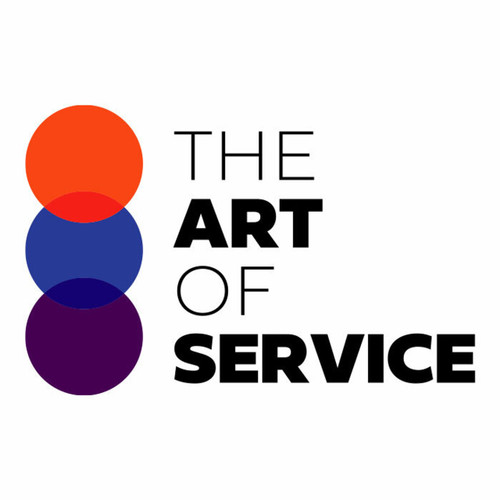We know that the first 90 days in a new role or project are crucial for success.
That′s why our knowledge base consists of the most important questions to ask to get results by urgency and scope.
With 1555 prioritized requirements, solutions, benefits, results, and real-life case studies/use cases, our knowledge base provides a comprehensive guide to excel in your first 90 days.
What sets us apart from our competitors and alternatives is the depth and breadth of our dataset.
Our Emotional Intelligence and First 90 Days Evaluation Knowledge Base is specifically designed for professionals who want to make the most out of their first 90 days.
It′s an easy-to-use product that provides detailed instructions on how to use the information effectively.
And the best part? It′s an affordable DIY alternative to expensive consulting services.
From product detail and specification overviews to comparisons with semi-related product types, our knowledge base offers a one-stop-shop for all your needs.
By using our proven techniques and strategies, you can significantly increase your emotional intelligence and ace your first 90 days with ease.
But don′t just take our word for it.
Our research has shown that professionals who utilize our knowledge base have seen a significant improvement in their performance and results in their first 90 days.
This tool is not just for individuals, but for businesses as well.
It can help HR teams streamline their onboarding process and ensure new hires are set up for success from day one.
And the best part? Our product is cost-effective, saving you time and money while still providing top-notch resources and guidance.
We understand that balancing a successful career and budget can be challenging, which is why we have created an affordable and accessible resource for you.
Still not convinced? Let us break down what our product does for you.
Our knowledge base offers a detailed understanding of emotional intelligence and its importance in the first 90 days.
It provides actionable steps and solutions to common challenges faced during this critical time period.
With our knowledge base, you can identify and prioritize your needs, create a customized plan, and achieve your goals.
Don′t miss out on this opportunity to invest in yourself and your success.
Take control of your first 90 days with our Emotional Intelligence and First 90 Days Evaluation Knowledge Base.
Order now and see the positive impact it can have on your professional growth and development.
Discover Insights, Make Informed Decisions, and Stay Ahead of the Curve:
Key Features:
Comprehensive set of 1555 prioritized Emotional Intelligence requirements. - Extensive coverage of 158 Emotional Intelligence topic scopes.
- In-depth analysis of 158 Emotional Intelligence step-by-step solutions, benefits, BHAGs.
- Detailed examination of 158 Emotional Intelligence case studies and use cases.
- Digital download upon purchase.
- Enjoy lifetime document updates included with your purchase.
- Benefit from a fully editable and customizable Excel format.
- Trusted and utilized by over 10,000 organizations.
- Covering: Project Evaluation, Interpersonal Relationships, Implementation Plans, Training And Development, Strategy Evaluation, Mentoring Opportunities, Conflict Resolution Models, Team Performance Analysis, Collaboration Tools, Market Evaluation, Measured Success, Learning Objectives, Quality Standards, Personal Strengths, Organizational Transition, Vision Setting, Emotional Intelligence, Team Motivation, Adoption Support, Organizational Culture, Conflict Management, Goal Setting, Succession Planning, Managing Stress In The Workplace, Change Readiness, Meeting Deadlines, Cultural Sensitivity, Organizational Goals, Job Board Management, Feedback Mechanisms, Work Life Integration, Project Deadlines, Stress Management, Problem Prevention, Efficient Decision Making, Cultural Competence, Setting Expectations, Performance Metrics, Cost Saving Strategies, Process Capabilities, Monitoring And Reporting, Cross Functional Collaboration, Workload Management, First 90 Days Evaluation, Data Intrusions, Coaching And Mentoring, Problem Solving Skills, Feedback And Recognition, Customer Needs Analysis, Communication Channels, Social Media Presence, Managing Up, Performance Feedback, Collaboration Skills, Change Culture, Market Trends, Budget Management, Performance Planning, Organization Transitions, Team Goals, Leveraging Strengths, Employee Recognition Strategies, Areas For Improvement, Decision Making, Communication Styles, Organizational Impact, Cost Evaluation, Innovation Strategies, Critical Thinking, Accountability Frameworks, Inclusion And Diversity, Performance Improvement, Project Planning, Skill Assessment, Reward And Recognition, Performance Tracking, Company Values, Negotiation Skills, Systems And Processes, Change Evaluation, Setting Boundaries, Risk Management, Career Growth Opportunities, Diversity Initiatives, Resource Allocation, Stress Reduction Techniques, Long Term Goals, Organizational Politics, Team Collaboration, Negotiation Tactics, Consistent Performance, Leadership Style, Work Life Balance, Team Cohesion, Business Acumen, Communicating With Stakeholders, Positive Attitude, Ethical Standards, Time Off Policies, Empathy And Understanding, Self Reflection, Strategic Thinking, Performance Goals, Flexibility And Adaptability, Creative Thinking, Timely Follow Up, Team Dynamics, Individual Goals, Feedback Implementation, Skills Evaluation, Conflict Avoidance, Leadership Development, Customer Satisfaction, Create Momentum, Onboarding Process, Technical Competence, Employee Engagement, Decision Making Models, Sales Techniques, Self Awareness, Global Perspective, Process Improvement, Time Management, Customer Service Strategies, Conflict Resolution, Building Trust, Tools And Technology, Risk Assessment, Problem Identification, Facing Challenges, Innovative Ideas, Ethical Considerations, Success Metrics, Employee Evaluation, Career Development, Learning From Failure, Cross Cultural Competence, Performance Reviews, Goals And Objectives, Personal Branding, Change Management, Process Materials, Team Performance Evaluation, Budgeting Skills, Time Constraints, Role Responsibilities, Decision Making Processes, Industry Knowledge, Career Advancement, Company Culture, Customer Interactions, Customer Retention, Data Analysis, Performance Evaluation Metrics, Creativity And Innovation, Constructive Criticism, Quality Control, Tracking Progress
Emotional Intelligence Assessment Dataset - Utilization, Solutions, Advantages, BHAG (Big Hairy Audacious Goal):
Emotional Intelligence
Emotional intelligence, the ability to identify and manage emotions, helps individuals recognize and address unconscious biases and communicate effectively, leading to the successful utilization of diverse perspectives in an organization.
1. Developing emotional intelligence training programs for employees to increase self-awareness and improve communication skills.
- Benefits: Helps employees recognize and manage their emotions, leading to better interpersonal relationships and understanding of diversity.
2. Conducting unconscious bias trainings to raise awareness and prevent biases from affecting decision-making processes.
- Benefits: Promotes a culture of inclusivity and reduces discrimination, fostering a more diverse and equitable work environment.
3. Implementing effective communication strategies, such as active listening and open dialogue, to enhance understanding and appreciation of diverse perspectives.
- Benefits: Facilitates better collaboration and problem-solving among team members with different backgrounds, promoting innovation and creativity.
4. Encouraging cross-cultural interactions and opportunities for employees to learn about different cultures and backgrounds.
- Benefits: Increases cultural competence and promotes respect and understanding for diversity within the organization.
5. Creating a safe and inclusive space for employees to share their thoughts and concerns related to diversity and inclusion.
- Benefits: Promotes a sense of belonging and psychological safety, leading to increased employee engagement and retention.
6. Providing resources and support for employees to address and manage their own unconscious biases.
- Benefits: Empowers employees to actively work towards addressing their biases, leading to a more inclusive and respectful workplace.
7. Hiring and promoting diverse candidates based on merit and potential, rather than solely on traditional measures of success.
- Benefits: Allows for a more diverse talent pool and brings in a variety of perspectives, contributing to a more innovative and dynamic workforce.
CONTROL QUESTION: How does emotional intelligence, unconscious biases, and communication play a role in effectively leveraging diversity within the organization?
Big Hairy Audacious Goal (BHAG) for 10 years from now:
By 2030, our organization will be a globally recognized leader in leveraging diversity through the integration of emotional intelligence, unconscious biases, and effective communication. We will have created a culture of inclusion where individuals from diverse backgrounds feel valued, respected, and empowered to contribute their unique perspectives and talents.
Emotional intelligence will be ingrained in our organizational culture, with all employees trained on its principles and actively practicing them in their daily interactions. This will allow us to better understand and manage our own emotions, as well as those of others, leading to greater empathy, collaboration, and overall well-being.
We will also address and challenge our unconscious biases, recognizing that they can hinder our ability to truly leverage diversity. Through ongoing education and open dialogue, we will create a safe space for individuals to explore and challenge their biases, promoting a deeper understanding and appreciation for diverse perspectives.
Effective communication will be another key component of our success in leveraging diversity. Our employees will be equipped with the necessary skills to communicate respectfully, inclusively, and effectively with individuals from different backgrounds. This will lead to improved relationships, increased innovation, and better decision-making.
Ultimately, through our commitment to emotional intelligence, addressing unconscious biases, and promoting effective communication, we will create a diverse and inclusive workplace that attracts and retains top talent from all walks of life. Our organization will not only excel in diversity but will also serve as a model for other businesses and industries on how to successfully leverage diversity for success and growth.
Customer Testimonials:
"The prioritized recommendations in this dataset have added immense value to my work. The data is well-organized, and the insights provided have been instrumental in guiding my decisions. Impressive!"
"I`ve recommended this dataset to all my colleagues. The prioritized recommendations are top-notch, and the attention to detail is commendable. It has become a trusted resource in our decision-making process."
"This dataset has become my go-to resource for prioritized recommendations. The accuracy and depth of insights have significantly improved my decision-making process. I can`t recommend it enough!"
Emotional Intelligence Case Study/Use Case example - How to use:
Case Study: Improving Diversity and Inclusion through Emotional Intelligence
Client Situation:
ABC Inc. is a multinational corporation operating in the technology industry with over 10,000 employees worldwide. The company prides itself on being a diverse and inclusive organization, with employees from various backgrounds and cultures. However, despite their efforts towards promoting diversity, the organization has been facing challenges in effectively leveraging it to drive business growth. There were frequent instances of unconscious biases, lack of open communication, and conflicts among team members, which affected the productivity and overall performance of the organization.
The leadership team at ABC Inc. realized that to achieve their goal of becoming a truly inclusive organization, they needed to address the issues of emotional intelligence, unconscious biases, and communication within their workforce. They sought the help of a consulting firm to design and implement a program that could equip their employees with the necessary skills and knowledge to leverage diversity effectively.
Consulting Methodology:
The consulting firm adopted a three-phase approach to address the client′s needs and achieve the desired outcomes.
I. Assessing the Current State:
The first phase involved conducting a thorough assessment of the organization′s current state regarding diversity, inclusion, and emotional intelligence. The consulting team used a combination of surveys, focus group discussions, and interviews with employees at all levels to identify the areas that needed improvement. They also analyzed the organization′s policies, HR practices, and diversity initiatives to identify any gaps or areas of improvement.
II. Developing a Customized Program:
Based on the findings of the assessment, the consulting team developed a customized program to bridge the identified gaps. The program focused on enhancing employees′ emotional intelligence, addressing unconscious biases, and promoting effective communication across all levels of the organization. This program included training modules, workshops, coaching sessions, and simulations to provide a comprehensive learning experience for the employees.
III. Implementation and Follow-Up:
The third phase involved implementing the program, tracking progress, and providing support to the organization throughout the process. The consulting team worked closely with the leadership team to monitor the progress, address any challenges, and make necessary adjustments to the program. They also provided regular feedback and coaching to employees to ensure effective implementation of the training.
Deliverables:
The consulting firm delivered the following key deliverables during the course of the project:
1. A comprehensive assessment report outlining the current state of diversity, inclusion, and emotional intelligence within the organization.
2. A customized program with training materials, workshops, and simulations to enhance emotional intelligence, address biases, and promote effective communication.
3. Regular feedback and coaching sessions for employees to monitor progress and provide support.
4. Implementation support and consulting services throughout the project.
Implementation Challenges:
During the implementation of the project, the consulting team faced several challenges, including resistance to change, lack of buy-in from some employees, and conflicting views on the importance of addressing diversity issues. To overcome these challenges, the consulting team utilized a multi-faceted approach, including targeted communication and stakeholder engagement, to ensure the success of the program.
KPIs and Management Considerations:
The success of this project was measured using both quantitative and qualitative metrics, including:
1. Improved employee satisfaction and engagement levels
2. Reduction in the number of conflicts and grievances related to diversity and inclusion
3. Increase in diversity representation across all levels of the organization
4. Enhanced collaboration and team performance
5. Improvement in employee retention rates, especially among underrepresented groups
To sustain the results achieved through the program, the consulting team recommended establishing a task force or steering committee responsible for driving diversity and inclusion initiatives and regularly updating policies and procedures to align with the program′s goals.
Citations:
1. “The Impact of Emotional Intelligence on the Success of Diversity Initiatives” by Kaplan DeVore and Norman Lynott.
2. “Emotional Intelligence, Unconscious Bias and Diversity” by TalentSmart.
3. “The Business Case for Diversity and Inclusion” by the Society for Human Resource Management.
4. “The Role of Emotional Intelligence in Managing Diversity” by Susan Hughes and Brad Nettles.
5. “Effective Communication in a Diverse Workplace” by Debrah Roundy and Kimberly Hayworth from the Journal of Workplace Learning.
Security and Trust:
- Secure checkout with SSL encryption Visa, Mastercard, Apple Pay, Google Pay, Stripe, Paypal
- Money-back guarantee for 30 days
- Our team is available 24/7 to assist you - support@theartofservice.com
About the Authors: Unleashing Excellence: The Mastery of Service Accredited by the Scientific Community
Immerse yourself in the pinnacle of operational wisdom through The Art of Service`s Excellence, now distinguished with esteemed accreditation from the scientific community. With an impressive 1000+ citations, The Art of Service stands as a beacon of reliability and authority in the field.Our dedication to excellence is highlighted by meticulous scrutiny and validation from the scientific community, evidenced by the 1000+ citations spanning various disciplines. Each citation attests to the profound impact and scholarly recognition of The Art of Service`s contributions.
Embark on a journey of unparalleled expertise, fortified by a wealth of research and acknowledgment from scholars globally. Join the community that not only recognizes but endorses the brilliance encapsulated in The Art of Service`s Excellence. Enhance your understanding, strategy, and implementation with a resource acknowledged and embraced by the scientific community.
Embrace excellence. Embrace The Art of Service.
Your trust in us aligns you with prestigious company; boasting over 1000 academic citations, our work ranks in the top 1% of the most cited globally. Explore our scholarly contributions at: https://scholar.google.com/scholar?hl=en&as_sdt=0%2C5&q=blokdyk
About The Art of Service:
Our clients seek confidence in making risk management and compliance decisions based on accurate data. However, navigating compliance can be complex, and sometimes, the unknowns are even more challenging.
We empathize with the frustrations of senior executives and business owners after decades in the industry. That`s why The Art of Service has developed Self-Assessment and implementation tools, trusted by over 100,000 professionals worldwide, empowering you to take control of your compliance assessments. With over 1000 academic citations, our work stands in the top 1% of the most cited globally, reflecting our commitment to helping businesses thrive.
Founders:
Gerard Blokdyk
LinkedIn: https://www.linkedin.com/in/gerardblokdijk/
Ivanka Menken
LinkedIn: https://www.linkedin.com/in/ivankamenken/







